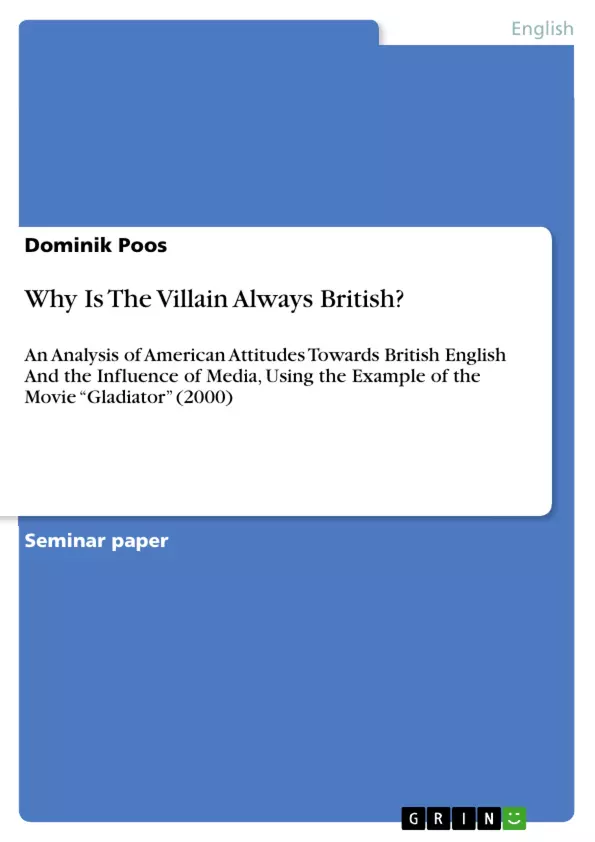Although they have been separated by history for many centuries, their common language often deceives into attributing America and Britain with equally common cultures, ideologies and communicative conventions. In this case, the English language acts as a “faux ami”. This is nowhere more apparent, than in the attitudes both nations developed due to the perception of each other's English. These “language attitudes” are generated, expressed and modified in many ways and differ substantially. But what attitudes do Americans have towards British English? How are these attitudes generated, expressed and modified? And what influence do the American media have on these processes? This paper answers these questions by presenting previous attitude studies and analysing their results, using the movie "Gladiator" (2000) as an example for American media.
Inhaltsverzeichnis (Table of Contents)
- Introduction
- Previous Research
- British and American Language Ideologies
- Language Attitude Studies
- "Accent and Social Class Effect on Status and Solidarity Evaluations" (1985)
- "Pax Americana? Accent attitudinal evaluations in New Zealand, Australia and America" (2001)
- "Attitudinal data from New Zealand, Australia, the USA and UK about each other's Englishes: Recent changes or consequences of methodologies?" (2005)
- The Media Influence on Language Attitudes
- Summary/ Research Questions
- Analysis of the Movie "Gladiator" (2000)
- Data/ Methodology
- Analysis
- Discussion
- Conclusion
Zielsetzung und Themenschwerpunkte (Objectives and Key Themes)
This paper aims to explore and analyze American attitudes towards British English. Specifically, it investigates how these attitudes are shaped, expressed, and modified, with a particular focus on the influence of American media. The analysis examines the differences between American and British language ideologies, explores the findings of previous language attitude studies, and delves into the role of media in shaping perceptions of languages.
- American and British language ideologies
- The impact of media on language attitudes
- The role of accents in shaping perception
- The influence of American media on attitudes towards British English
- An analysis of the film "Gladiator" (2000) as a case study of American media representation of British English
Zusammenfassung der Kapitel (Chapter Summaries)
The introduction discusses the complexities of the relationship between American and British English, highlighting the disparity between the two countries' shared language and differing cultures, ideologies, and communicative conventions. The paper then establishes its objectives and outlines its structure, which includes both theoretical and empirical components.
The second chapter delves into previous research, focusing on the differences between British and American language ideologies. The chapter analyzes the concept of "standard language ideology" and explores how it has developed in both countries, highlighting the divergence between "Mainstream United States English" (MUSE) and "Received Pronunciation" (RP). The chapter then explores how these divergent ideologies influence perceptions of English, particularly in relation to social class and ethnicity.
The third chapter further explores the topic of language attitude studies by presenting the findings of three key studies conducted between 1985 and 2005. These studies provide insights into the American perception of British Received Pronunciation and its association with status and solidarity evaluations.
Schlüsselwörter (Keywords)
This paper focuses on key concepts such as American and British language ideologies, language attitude studies, media influence, accent perception, and the analysis of film as a case study. The research explores the role of American media in shaping attitudes towards British English, drawing on examples from the film "Gladiator" (2000) to demonstrate how accents can contribute to the construction of character and narrative.
Frequently Asked Questions
Why are villains in American movies often portrayed with British accents?
This portrayal is often linked to American language attitudes where British Received Pronunciation (RP) is associated with high status, intelligence, and lack of warmth, making it a useful cinematic tool for creating sophisticated yet detached villains.
What is the "faux ami" effect of the English language between the US and UK?
The common language can be a "false friend" because it deceives people into thinking both nations share the same culture and communicative conventions, while their underlying ideologies often differ significantly.
How does the movie "Gladiator" (2000) serve as an example in this study?
The paper analyzes "Gladiator" to show how American media uses different English accents to construct character identities and influence audience perceptions of status and solidarity.
What are "language attitudes"?
Language attitudes are the feelings, beliefs, and prejudices people have toward certain languages or accents, which often reflect social class, ethnicity, and perceived intelligence.
What is the difference between MUSE and RP?
MUSE (Mainstream United States English) is the perceived standard in the US, while RP (Received Pronunciation) is the traditional standard of British English often associated with the upper class.
Can media change our attitudes toward accents?
Yes, the paper argues that media both reflects and modifies existing language attitudes by reinforcing stereotypes or introducing new associations through character portrayals.
- Citar trabajo
- Dominik Poos (Autor), 2013, Why Is The Villain Always British?, Múnich, GRIN Verlag, https://www.grin.com/document/233422



